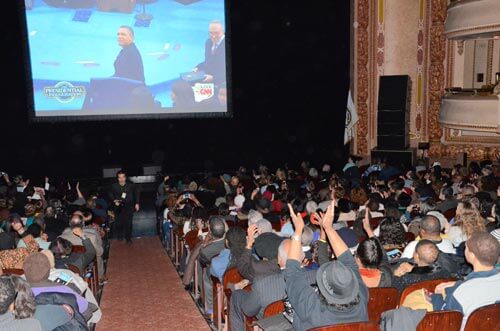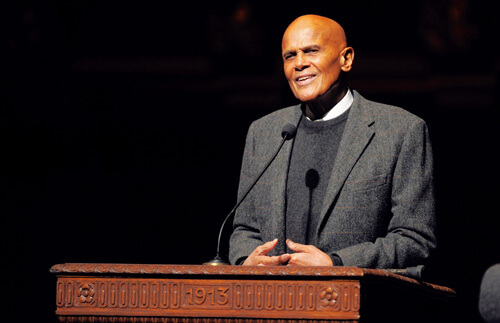At Brooklyn Academy of Music where New Ylrk City’s 27th annual citywde tribute to Dr. Martin Luther King Jr. invited visitors to celebrate the legacy of the civil rights martyr, a historic double-header also hailed another prominent African-American who changed the course of America by becoming the first Black president of the United States.
The oldest performing arts center in America — which is acclaimed for hosting the largest, annual celebration of the national holiday — filled to capacity for a program which included speakers and a concert tribute to the slain Nobel laureate and also provided simulcast viewing of the inauguration of President Barack H. Obama, the 44th U.S. president.
It could have easily been tagged the best vantage point to cheer Kings County and also herald the day’s historic significance due to the alluring program marked by a keynote address from activist/actor Harry Belafonte, one of Dr. King’s colleagues, Dr. William L. Pollard, president, Medgar Evers College and Marty Markowitz, the borough’s president.
Emceed by Brooklyn’s Deputy Borough President, Sandra Chapman, a program incorporated the legacies of the two iconic Americans with remarks from Ron Shuler, Karen Brooks Hopkins, (BAM) and entertainment which featured Kindred, The Family Soul and the Brooklyn Interdenominational Choir.
Belafonte received celebrated greeting.
The much-admired, tall, bald-headed New Yorker might have inspired a patron to break protocol to shout platitudes and also endear calypso with lyrical embellishments to his hit song “Day-O.”
Belafonte returned greetings saying he was “particularly honored to talk to citizens of Brooklyn.”
“I felt compelled to be here at BAM with those who live here and those from the country in the Caribbean I grew up.”
Born in Harlem, Belafonte grew up in Jamaica where his mother was born.
He wasted little time but promptly explained his relationship with the celebrated Civil Rights honoree.
“Martin was my friend, my closest. The latest time I saw him was a few days before he went to Memphis – he came to my home in New York City,” Belafonte said.
The hush throughout the audience provided acoustically-perfect enhancement to the landmark.
According to Belafonte, the preacher made a trip north to dissuade disgruntled residents of Newark, New Jersey from “burning the city.”
He said many living there had become weary from “unjust treatment.”
Dr. King’s visit, he said was a calculated choice because after demonstrating solidarity with the sanitation workers in Memphis, he planned to launch a poor people’s campaign.
In order to dramatize the economic disparity that existed throughout the country: “we strategized to go to Washington…park ourselves on the steps of the Capitol…and demand” equity.
“He knew it would be the most difficult of all the hurdles” he maneuvered, Belafonte continued.
The actor’s tone and resonance connected with the crowd as he reflected on the task he and his colleagues intended with a challenge to the government during the late 1960s.
He said among the issues to tackle were dismantling banks, disturbing the casual and corrupt system which he said enriched the rich and offered no hope to the poor.
During Dr. King’s visit to Belafonte he said the leader described his mission akin to “integrating into a burning house.”
The activist/actor said he had no response to Dr. King’s description but asked what could be done.
“We have to become firemen,” Dr. King allegedly responded.
The profound allegory seemed “a metaphor for how he (King) saw America was going.”
“America lost its moral compass and was drifting beyond reprieve.”
In his address, Belafonte also commended Pres. Obama on his second inauguration.
He said he hopes the president will look at the Memphis agenda and say ‘I am a fireman.”
“The moral rudder on our ship is still broken,” Belafonte added. “I hope you will hold the president to his promises.”
He referenced New York City’s stop and frisk law; the war in Afghanistan, the plight of peoples of color, and admonished the rising prison population.
“We build more prison cells than schools,” Belafonte said.
“Black people are not at the forefront of the fight against guns – our leaders are silent.
They should be writing the laws. Martin Luther King had America at its back, right on his side – the church, the campuses, victims, Black people, the poor – it was America in motion.”

Photo by Christopher Griffith























